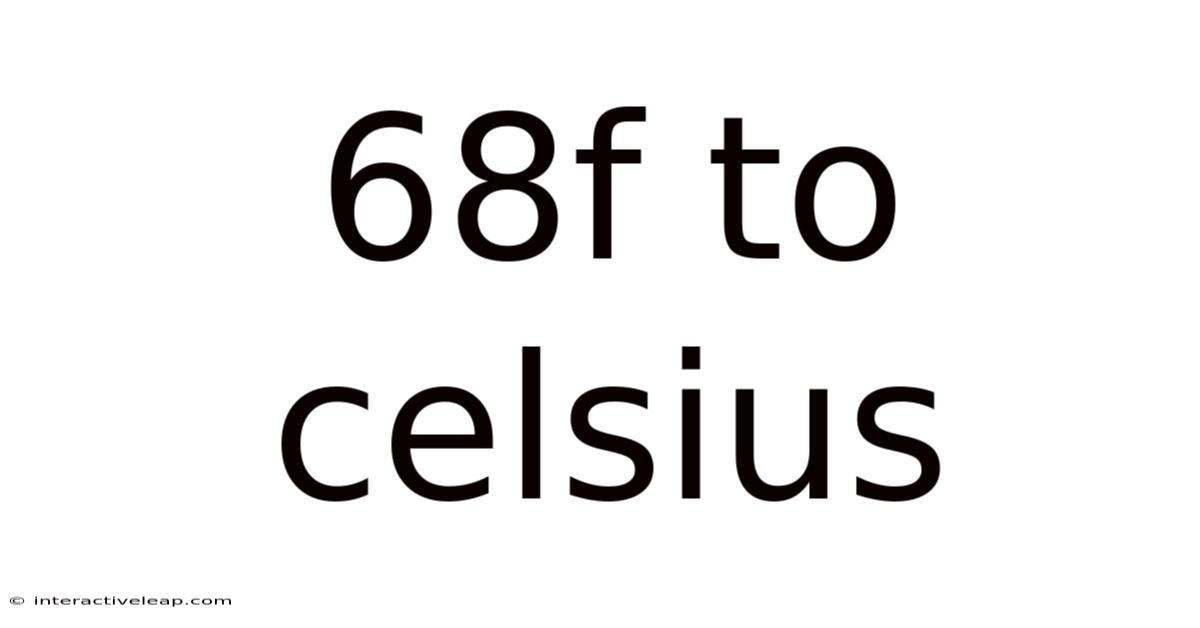68f To Celsius
interactiveleap
Sep 15, 2025 · 4 min read

Table of Contents
Converting 68°F to Celsius: A Deep Dive into Temperature Conversions
Knowing how to convert Fahrenheit (°F) to Celsius (°C) is a crucial skill, whether you're checking the weather forecast for a trip abroad, following a recipe from a different country, or simply understanding global temperature discussions. This article will thoroughly explain how to convert 68°F to Celsius, providing not just the answer but a comprehensive understanding of the conversion process, its underlying science, and frequently asked questions. We'll explore various methods, ensuring you can confidently perform this conversion in any situation.
Understanding the Fahrenheit and Celsius Scales
Before diving into the conversion, let's briefly understand the two scales. The Fahrenheit scale, primarily used in the United States, defines the freezing point of water as 32°F and the boiling point as 212°F. The Celsius scale, used almost everywhere else and favored in scientific contexts, defines the freezing point of water as 0°C and the boiling point as 100°C. This difference in reference points is the key to understanding the conversion process.
Method 1: Using the Conversion Formula
The most common and accurate method for converting Fahrenheit to Celsius is using the following formula:
°C = (°F - 32) × 5/9
Let's apply this to our example of 68°F:
°C = (68°F - 32) × 5/9 °C = 36 × 5/9 °C = 20
Therefore, 68°F is equal to 20°C.
This formula is derived from the relationship between the scales' reference points. The factor 5/9 accounts for the different temperature intervals between the freezing and boiling points of water on the two scales. Subtracting 32 adjusts for the difference in the freezing point.
Method 2: Using an Online Converter
While understanding the formula is important, numerous online converters readily perform this conversion for you. Simply search for "Fahrenheit to Celsius converter" on your preferred search engine, enter 68°F, and the converter will instantly provide the equivalent Celsius value. These tools are convenient for quick conversions, but understanding the formula remains beneficial for various applications.
Method 3: Understanding the Relationship through Simple Arithmetic (Approximation)
While less precise, a quick approximation can be useful for everyday estimations. Note this method should not be used when high accuracy is needed.
A rough approximation is to subtract 32 from the Fahrenheit temperature and then halve the result. This method is based on the fact that a change of 18°F is approximately equal to a change of 10°C.
For 68°F:
- Subtract 32: 68 - 32 = 36
- Halve the result: 36 / 2 = 18
This approximation yields 18°C, which is close but not exactly equal to the precise value of 20°C. The further you are from the reference point of water, the less precise this method becomes.
The Scientific Basis of Temperature Conversion
The conversion formulas are not arbitrary; they stem from the fundamental properties of heat and temperature. Temperature is a measure of the average kinetic energy of the particles within a substance. Both Fahrenheit and Celsius scales measure this energy, but they use different reference points and scales to quantify it. The conversion formula mathematically adjusts between these different scales and reference points.
Practical Applications of Fahrenheit to Celsius Conversion
The ability to convert between Fahrenheit and Celsius is useful in various everyday situations:
- International travel: Weather forecasts and temperature information in many countries use Celsius.
- Cooking and baking: Recipes from different regions may use different temperature scales.
- Scientific research: Scientific data is often reported using Celsius.
- Understanding global climate change: International climate reports use Celsius to track global temperature trends.
- Medical applications: Body temperature is often measured and reported using Celsius in many healthcare settings.
Frequently Asked Questions (FAQs)
Q: Is there a formula to convert Celsius to Fahrenheit?
A: Yes, the reverse conversion formula is: °F = (°C × 9/5) + 32
Q: Why are there two different temperature scales?
A: Historically, different scales developed independently. Fahrenheit was developed earlier and based on different reference points than Celsius, which is now the more widely used scientific standard.
Q: Which scale is more accurate?
A: Both scales are equally accurate in measuring temperature; they simply use different scales and reference points. Celsius is generally preferred in scientific applications because its scale is more intuitive and based on the readily understandable freezing and boiling points of water.
Q: What is the absolute zero point in Celsius and Fahrenheit?
A: Absolute zero, the theoretical point where all molecular motion ceases, is -273.15°C and -459.67°F.
Q: Are there other temperature scales besides Celsius and Fahrenheit?
A: Yes, there are others such as the Kelvin scale, which is an absolute temperature scale (0 Kelvin is absolute zero). The Kelvin scale is widely used in scientific contexts, particularly in physics and thermodynamics.
Conclusion
Converting 68°F to Celsius, as shown above, is a straightforward process once you understand the conversion formula. The formula, °C = (°F - 32) × 5/9, allows for precise conversions. While online converters offer convenience, understanding the underlying principles enhances your understanding of temperature scales and their practical applications. From daily life to scientific research, the ability to convert between Fahrenheit and Celsius is a valuable skill. Remember, while quick approximations can be helpful, always prioritize the formula for accuracy, especially in contexts where precision is critical.
Latest Posts
Latest Posts
-
X 2 4x
Sep 15, 2025
-
0 07 In Fraction
Sep 15, 2025
-
Ashfields Polo Club
Sep 15, 2025
-
Opposite To Gentle
Sep 15, 2025
-
38 8f To C
Sep 15, 2025
Related Post
Thank you for visiting our website which covers about 68f To Celsius . We hope the information provided has been useful to you. Feel free to contact us if you have any questions or need further assistance. See you next time and don't miss to bookmark.